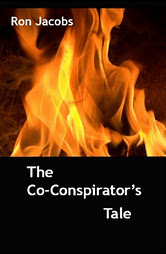The Lamentations of Julius Marantz
Marc Estrin, Unbridled Books, 2007
I don't know how familiar folks are with them in other parts of the United States, but down here in North Carolina, I've seen the bumperstickers that read "In case of rapture this car will be unmanned" all too often. The funny thing about the sticker though, is that the drivers of the vehicles they appear on seem to be deadly serious. They truly believe that they will be one of the 144,000 that will be bodily lifted into the heavens at any time. I'm not one to lampoon someone else's religious beliefs in public (no matter how ridiculous they may seem), but if there are only 144,000 souls that will experience this end of the world, how can there be so many cars with those bumperstickers on them?
Since the intention of this piece is not to address this and other pressing theological questions but to review the latest fictional work from Marc Estrin, I'll leave the quandary produced by those bumperstickers in the hands of men and women better trained in such matters. It certainly seems to be at least as important as how many angels can actuality fit on a pin-a question that is probably still being debated in some seminary on the planet..
Estrin's novel, titled The Lamentations of Julius Marantz (Unbridled Books, 2007), twists the rapture into a comic conspiracy of the right wing US government and the Sierra Club (among others) designed to rid the government of its leftist and Islamic enemies, end the leak in the ozone, and consolidate the government's right wing political base. It all begins with the misadventures of Julius Marantz, a clubfooted Jewish-American physicist who has invented an anti-gravity device. Unwittingly, he allows the device, known simply as 'the doodad," to fall into the hands of GEKO, a rightwing coalition of corporate lobbyists, Christian religious leaders, military men, and a good portion of the United States government. The intentions of GEKO become all too clear as they begin to use the Doodad to remove their enemies from the face of the earth.
Thus begins Julius' attempts to get the Doodad back while avoiding the GEKO secret police attempting to capture Julius and send him up with the rest of their raptured enemies. Meanwhile, back on earth, the reader is presented with a potentially real rally of bikers high on Jesus. Estrin's manipulation of the language used by the Falwells, Robertsons, Swaggarts and their lesser brethren quietly exposes the vacuum behind the televangelists' revival circus. Besides that, it points out the underlying comedic absurdity of it.
For Julius, who spent his younger years spying on adult life on Coney Island weekends, this newest circus is reminiscent yet less instructive than his boyhood jaunts. He learns nothing new about the fantastic extravagances of human nature. Indeed, he only learns more about those who would prevent those extravagances because of their own lust for money and power. Furthermore, like Estrin's other anti-heroes Marantz looks to love for release from the ugliness he discovers. He goes underground in search of an old lover whom he hopes will join him in his crusade to fight the government and get the Doodad back. When that fails Julius, like Gregor Samsa, Estrin's most famous protagonist from the novel Insect Dreams, ends up giving up his fight against the evil he knows lurks in the hearts of the powerful and decides to seek his release via death.
It's another clever tale told here by Mr. Estrin. Nominally a Jewish novel (whatever the hell that is), it is a novel about the nonsensical manipulations we take in the name of religion. It is also a story bout how those manipulations can and are used against the religious--rarely for their own good. Like the tales of Jonathan Swift, Estrin's satire of modern day America is more than just a joke. It's a warning we might do well to heed.





